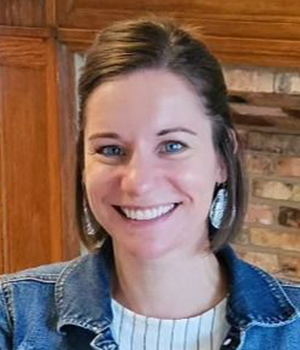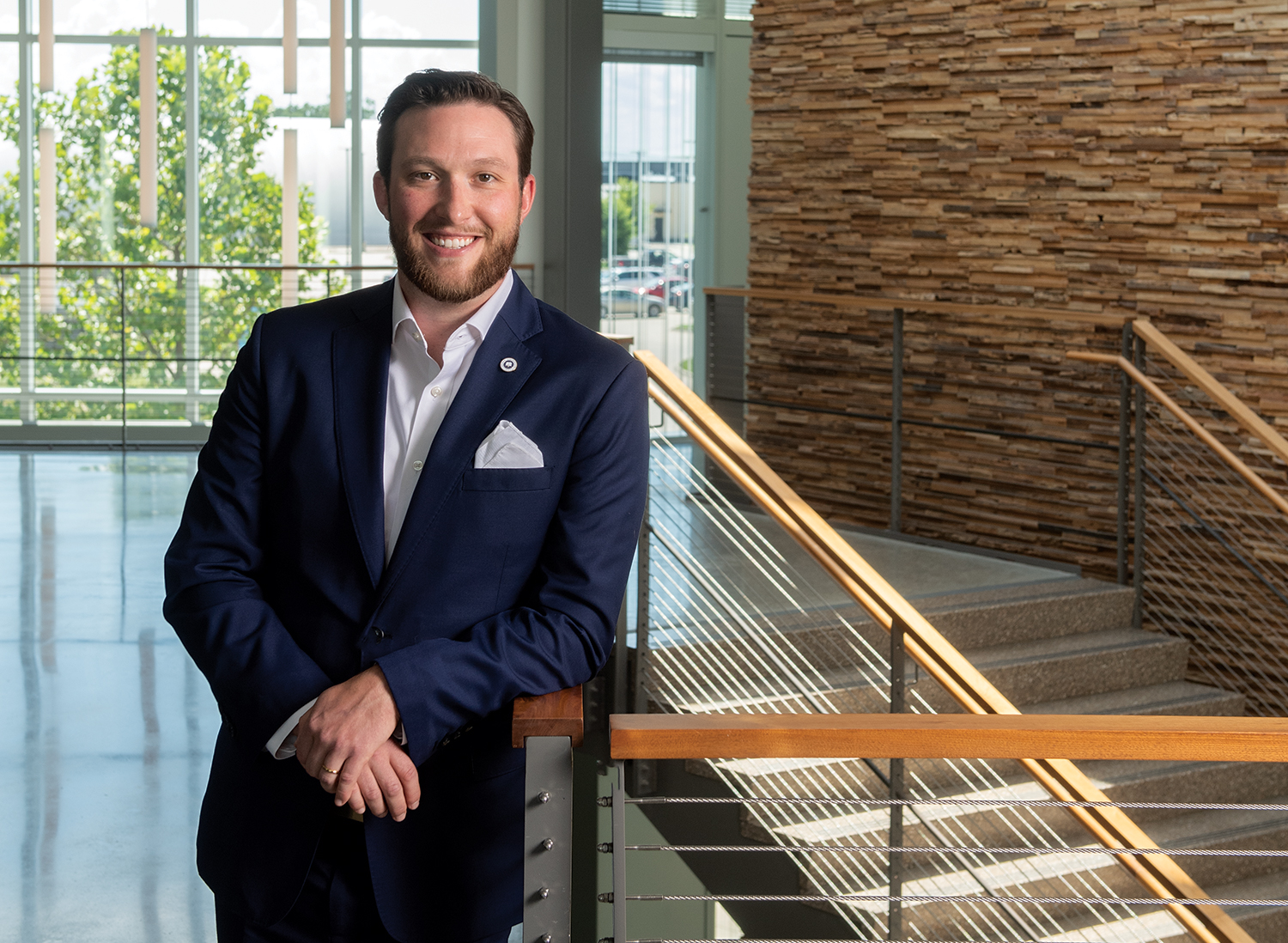‘Silver tsunami’ of upcoming small business retirements has advocates paying attention to succession planning

Lisa Rossi Oct 10, 2025 | 6:00 am
7 min read time
1,606 wordsBusiness Record Insider, Economic Development, Innovation and Entrepreneurship, Statewide NewsOlivia Randall and her husband, Josh Randall, are already preparing their children for potential business ownership as they look to the future of their Mount Vernon clothing business, Bauman’s
They plan to position the more than century-old business so one or more of their four children – who are 7, 5, 3 and a newborn – can take over one day. Olivia Randall is already training them in some of the ins and outs of running a store.
“They take my deposit over to the bank,” she said. “They go get me stamps at the post office. They’ll check out. They like using the cash register a lot. They really like if they can scan items and tell people what they owe us and take their credit card. … Sometimes they put price stickers on things. They stamp my bills for me, put the stamps and put my return address on my bills, and take them to the post office.”
Small business support organizations and city leaders in Iowa and beyond are monitoring trends around small business succession plans, which plan for a transition of ownership. The Randalls bought Bauman’s from the previous owner in July 2019 after he put a piece in the local newspaper about his hope to retire but keep the business going.
It is estimated that over half of U.S. business owners are 55 and over, according to the U.S. Census Bureau 2019 Annual Business Survey, with data from the year 2018. That will create a “silver tsunami” of retirements and even closures, some small business advocates say.
“Succession planning for Main Street businesses is definitely a growing concern, not only across Iowa, but nationwide, we are seeing an aging population of business owners, especially in the rural communities, which is where a lot of our Main Street communities are located,” said Austin Strawhacker, state director of America’s Small Business Development Center Iowa, also known as Iowa SBDC. The center has 15 regional centers located across the state to offer services to Iowa small businesses and entrepreneurs.
“And as those business owners age, we will see a significant wave of ownership transition in the coming decade,” Strawhacker said. “To further complicate that, many businesses are family-owned or sole proprietorships, and a lot of them do not have succession plans in place, which not only puts the business community and the Main Street district at risk, but also puts local economies and jobs at risk.”
Succession planning is something small business advocates have been aware of for several decades now, Strawhacker said, though the urgency has “really risen in probably the last five to 10 years.”
For a smoother exit, business owners need to start thinking about the succession plan early in the establishment of the business, he said.
“We like to tell people that you can’t start planning your exit soon enough, and that’s not to encourage people to ultimately exit their business, but at least to set them up for success when that time does come,” he said. “A couple of steps that the business owners need to start taking seriously is, first an assessment of the owner’s readiness and goals in their exit strategy. Second would be, when you get a little bit closer to the actual exit date, a valuation to determine the business’s worth.”
After that, it’s good to examine succession planning options, whether it be family succession, an employee buy-out option or employee stock ownership options, a third-party sale or mergers and acquisitions. The last option is closure or liquidation.
When it comes to family succession in Iowa, the loss of educated workers can sometimes be an issue, experts said.
“I think it’s incredible that we have empowered our younger generations to think so broadly that they feel as if they have every option in the world in front of them for their professional journey, and in part because we’ve empowered them and trained them so well, sometimes they don’t think about small business ownership or entrepreneurship as a career path,” Strawhacker said.
He pointed to a “huge increase in entrepreneurship training” in Iowa, with the five John Pappajohn centers for entrepreneurship across the state.
“They all do a tremendous job empowering the next generation to consider entrepreneurship as a legitimate career opportunity. Where I think sometimes we miss the mark on this a little bit is with taking over ownership of an existing business,” he said.
Strawhacker said entrepreneurship is often taught as innovation, and that’s important for scientific developments and research environments that are created for young people to develop groundbreaking technologies.
“I’m not trying to diminish that at all, but there is a whole other part of the small business community, and specifically at Main Street Iowa and rural communities across the country, where we have a need for solid business acumen in a younger generation who is empowered to think about owning an existing business, either through a family transaction or as a third-party buyer, but we need to empower young people to consider that as a career option, as well,” he said.

Stacy Mullinex, senior project manager at Advance Iowa at the University of Northern Iowa, which provides support to Iowa businesses navigating change, said baby boomers are trying to exit their businesses – and that isn’t necessarily a bad thing.
“That’s good,” she said. “Get the next generations involved. But the problem is, of everyone that goes to sell their business, depending on what stat you look at, of every small business that goes to sell, 70% to 80% of those businesses don’t sell, they close down.”
Closure is one of the pieces Advance Iowa tries to mitigate, because when a small business closes, it creates a “huge void in the community,” Mullinex said.
For example, if a grocery store closes, then a customer leaves their community to get groceries. Then they might frequent other businesses in that town as well.
“All of a sudden the money starts to leave that area,” she said. “So it’s important for the whole ecosystem to make sure these small businesses stay in place.”

In Mount Vernon, Skillet Cafe recently closed, the community’s only breakfast restaurant, said Jessie Thurn, executive director of the Mount Vernon-Lisbon Community Development Group. The community has also lost a diner.
“We don’t know if there was any form of succession plan, or how [they] tried to sell, but it seemed pretty quick,” she said of Skillet Cafe, noting that the restaurant industry is tough as it requires those who can work evening hours. “It’s something that we need to be looking to find the right people who can work those hours and run the demand of it and bring more success and more opportunity to the businesses on Main Street and the services and people living in our community.”

In a rural community with a lower density population, there is a “churn” of businesses that open and close, said Bill Menner, executive director of the Iowa Rural Development Council, which is focused on the vitality of small towns.
“When you have an established business, one the community values, and those owners aren’t thinking about what happens next, then you get into problems,” Menner said. “It’s a hard issue to broach. Sometimes, when you are the chamber director or you’re the economic developer or you are the mayor, to have the owner of a business [and] say to them, ‘Hey, you know, you’re getting up there in years. What’s going to happen next?’ It’s a hard conversation to start, and that topic of what’s going to happen to your business sometimes is a personal thing for that business owner, and it’s not easy to bring up.”

In Marshalltown, local partners are hosting a series of events on succession planning for area business owners called “Navigating Tomorrow: Your Future-Ready Succession Plan,” said Danielle Lekin, executive director of the Marshalltown Central Business District, a nonprofit that focuses on economic development and historic preservation of the city’s downtown.
Sessions have included a panel with business owners who have successfully navigated succession planning, a toolkit for succession planning and a session geared specifically toward farm families and navigating a successful generational farm transition.
One way to navigate the awkwardness of broaching the topic of succession planning is not targeting one person, Lekin said.
“You create a program or programming, and you invite everybody to come, so everybody’s getting the information,” she said. “And then you create a format where [you can say] ‘Hey, if you’d like to talk more in depth about this, I’m happy to sit down and talk to you.’”

Miranda Welbourne Eleazar, assistant professor of management and entrepreneurship at the Tippie College of Business at the University of Iowa, said in some ways the silver tsunami may not be as much of a concern.
She said many people start a business as a second career, so they might be likely to keep working longer.
“They might still have years ahead of them, so they might keep working on it until their 70s, or as long as they can, because this is their passion that they’re doing after they already had a full career,” she said. “So in a way, I’m not as worried, because I don’t know if our endpoint is the same when we talk about entrepreneurship as more corporate jobs. … This is something they wanted to do their whole lives, and they finally got the opportunity, and maybe they chose a business that really aligns with their lifestyle, so they could keep on working in it.”

Lisa Rossi
Lisa Rossi is a staff writer at Business Record. She covers innovation and entrepreneurship, insurance, health care, and Iowa Stops Hunger.









